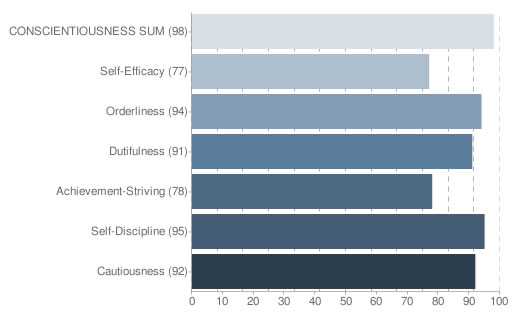One of the five factors the Market Awareness Profile (MAP) measures is conscientiousness– the way in which we control, regulate, and direct our impulses. Impulses are not inherently bad; occasionally time constraints require a snap decision, and acting on an initial impulse can be an effective response. Nonetheless, acting on impulse can lead to trouble in a number of ways. Acting impulsively disallows contemplating alternative courses of action, some of which would have been wiser than the impulsive choice. This can be especially true when referring to trades taken (or not taken) which can lead to regret.
High scorers tend to be more organized and less cluttered in their trading space. They tend to avoid trouble and achieve high levels of success in the markets through purposeful planning and persistence (discipline). On the other hand, they can be compulsive perfectionists and miss some opportunities. In doing so, counterfactual thinking can consume the thought process and lead to a false sense of self-efficacy.
Low scorers may be considered unreliable, lack ambition, are easily distracted, and less likely to adhere to trading rules. Trading plans may be thrown aside for gut feelings and, at times, this may be beneficial as the ability to recognize trouble early could minimize losses. However, trading plans work and work best when strictly adhered to which would suggest low conscientiousness traders tend to favor a discretionary trading style. Unfortunately, a majority of discretionary traders fail to become a market master simply because of the lower odds of success, especially when compared to a more mechanical system.
High scores on conscientiousness are desirable and work well for mechanical systems and a hybrid system with both mechanical and discretionary aspects. A low score on conscientiousness does not mean you will be a failure at trading, but your equity curve may not be enough to sustain a period of consistent profitability. This is mainly due to the inability to remain focused and control impulses which hinder success as time is spent focusing on the self (what you think should happen) and not the markets (actual price action).
 To better understand conscientiousness, let’s take a look at the six facets that make it up:
To better understand conscientiousness, let’s take a look at the six facets that make it up:
- Self-Efficacy. Self-Efficacy describes confidence in one’s ability to accomplish things. High scorers believe they have the intelligence (common sense), drive, and self-control necessary for achieving success in trading. Low scorers do not feel effective, and may have a sense that they are not in control of their trading. However, consideration needs to be given to motivation for success as complacency with the way things are may be the reason for a low score.
- Orderliness. Traders with high scores on orderliness are well-organized and stick to routines and schedules. They tend to make trading plans and use them. Low scorers tend to be disorganized and scattered. Trading plans are viewed as not being important as rules are too confining.
- Dutifulness. This scale reflects the strength of a person’s ability to stick to a trading plan. Those who score high on this scale have a strong sense of moral obligation. Low scorers find trading plans overly confining and thus less likely to follow or even create one. Perhaps trading is seen as more of a “hobby” or just for “fun.”
- Achievement-Striving. Individuals who score high on this scale strive hard to achieve excellence. Their drive to be recognized as successful keeps them on track toward their goals. Low scorers are content to get by with a minimal amount of work, and might be seen by others as lazy.
- Self-Discipline. One of the largest contributors to success as a trader is self-discipline. High scorers are able to strictly adhere to a trading plan and stay on track despite distractions. Low scorers procrastinate, are easily discouraged and show poor follow-through. The lack of self-discipline will make your trading career rather short lived.
- Cautiousness. Cautiousness describes the disposition to think through possibilities before acting. High scorers on the Cautiousness scale take their time when making trading decisions and manage risk well. Low scorers often trade without deliberating alternatives and the probable consequences of those alternatives. Scoring too high on this scale can have its downside as trading opportunities may be missed for the discretionary trader. The more mechanical systems trader will account for this through their strategy.
Personality traits describe, relative to other people, the frequency or intensity of a person’s feelings, thoughts, or behaviors. Possession of a trait is therefore a matter of degree. Please keep in mind that “low,” “average,” and “high” scores on a personality test are neither absolutely good nor bad. As with any personality inventory, scores and descriptions can only approximate an individual’s actual personality. However, the real value of the results can be seen as you focus on areas of improvement when processing closed trades. In addition, how you present yourself outside of trading (I’d include how you see yourself) can be vastly different once money is involved.
